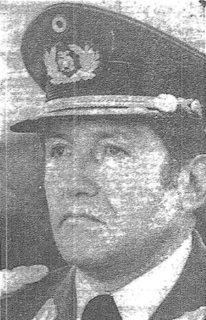
Luis García Meza Tejada was a Bolivian general who served as the de facto 57th President of Bolivia from 1980 to 1981. He was a dictator convicted of human rights violations and leader of a violent coup. A native of La Paz, he was a career military officer who rose to the rank of general during the dictatorship of Hugo Banzer (1971–78).

Lidia Gueiler Tejada was a Bolivian politician who served as the 56th President of Bolivia on an interim basis from 1979 to 1980. She was Bolivia's first female Head of State, and the second in the history of the Americas.

The Revolutionary Party of the Nationalist Left was a left-wing political party in Bolivia. It was founded in 1963 by the labor leader Juan Lechín Oquendo and by Mario Torres Calleja and Edwin Moller in lesser roles. The PRIN seceded from the Revolutionary Nationalist Movement (MNR) in protest against Víctor Paz Estenssoro's decision to seek a third elected term as president in 1964, rather than permit then Vice-President Juan Lechín to have the MNR's presidential nomination.

Alberto Natusch Busch was a Bolivian general who served briefly as the de facto 55th President of Bolivia in 1979.

Celso Torrelio Villa was a military general and a member of the Junta of Commanders of the Armed Forces (1981), who served as the de facto 58th President of Bolivia from 1981 to 1982.

General Guido Hernán Vildoso Calderón is a former Bolivian military officer who served as the de facto 59th President of Bolivia in 1982. He was Bolivia's final de facto president.
The Junta of Commanders of the Armed Forces (1981) was a military junta which ruled Bolivia from August 4, 1981, through September 4, 1981 and consisted of Commander of the Bolivian Air Force, General Waldo Bernal Pereira; General of the Bolivian Army, Celso Torrelio; and Óscar Jaime Pammo, a Rear Admiral in the Bolivian Navy. This junta was preceded by President Luis García Meza Tejada.

The history of Bolivia from 1964 to 1982 is a time of periodic instability under various military dictators. On November 4, 1964, power passed from the elected leader of the Bolivian National Revolution, Víctor Paz Estenssoro to a military junta under popular vice-president General René Barrientos. Barrientos was elected president in 1966, but died suspiciously in a helicopter crash in 1969 while touring the countryside visiting the indigenous people of Bolivia, this led to a coup in September 1969 by General Ovando, who was overthrown in October 1970 by General Rogelio Miranda who was overthrown a couple of days later by General J.J.Torres, who in turn was overthrown in August 1971 by Hugo Banzer Suárez. Banzer ruled for seven years, initially from 1971 to 1974 with the support of Estenssoro's Nationalist Revolutionary Movement. In 1974, impatient with schisms in the party, he replaced civilians with members of the armed forces and suspended political activities. The economy grew impressively during Banzer's presidency, but demands for greater political freedom undercut his support. He called elections in 1978 and Bolivia once again plunged into turmoil. Juan Pereda ruled for only four months in 1978, but his ascent to the presidency marked the beginning of an even more unstable period in Bolivian history, with nine civilian and military presidents in little over four years (1978–1982). 1982 marked the return to a democratically elected government, with Guido Vildoso as president.

Juan Fernando del Granado Cosío is a Bolivian human-rights lawyer and politician, mayor of La Paz (2000–2010) and founder of the Movement without Fear, a progressive political party. On November 11, 2013, he officially announced his candidacy for president of Bolivia for the 2014 election.
The illegal drug trade in Bolivia is complicated by a longstanding indigenous tradition of using coca leaf for chewing and for coca tea. In an example of the balloon effect, dramatic falls in coca cultivation in the late 1990s saw some cultivation move to Colombia.

General elections were held in Bolivia on 29 June 1980, the third in three years. As no candidate in the presidential elections received a majority of the vote, the National Congress was required to elect a President on 6 August. With Hernán Siles Zuazo of the Democratic and Popular Union the favourite to win the Congressional ballot, the process was disrupted on 17 July by the military coup led by General Luis García Meza Tejada. However, Meza was pressured to resign on 4 August 1981, resulting in General Celso Torrelio becoming president. In July 1982 he was replaced by General Guido Vildoso, who was named by the high command to return the country to democratic rule. On 17 September 1982, during a general strike that brought the country close to civil war, the military decided to step down, to reconvene the National Congress elected in 1980, and to accept its choice of president. Accordingly, the National Congress revalidated the 1980 election results on 23 September and overwhelmingly elected Hernán Siles Zuazo as president on 5 October. He subsequently assumed the presidency on 10 October 1982.
The Authentic Revolutionary Party was a political party in Bolivia.
The Revolutionary Party of the National Left – Gueiler was a small centrist political party in Bolivia.
The High Command of the Military of Bolivia entrusted General Luis García Meza Tejada with the Presidency on 18 July 1980, and he formed his cabinet.
Tejada is a surname of Spanish origin. It is locational from the town of Tejada, and is recorded heraldically both in La Rioja, Seville and Castille.
The National Commission of Inquiry Into Disappearances was a truth commission in Bolivia that lasted from 1982 to 1984. It was the first truth and reconciliation commission in Latin America. After a period of political instability in the country and a series of military coups and corrupt governments and dictatorships, the newly appointed president Hernán Siles Zuazo hoped to restore the country to democracy when he came to power in October 1982. Siles Zuazo established the National Commission of Inquiry Into Disappearances to look into suspicious disappearances that occurred between 1967 and 1982, and hired 8 commissioners to research and investigate. The commission was forced to disband after less than 2 years of work due to lack of financial and political support from the government, as well as the commission's limited mandate, which only allowed investigations into death or disappearance and not into other crimes against humanity. Although the commission disbanded, 56 officials from past governments were put on trial in the "Trials of Responsibility", including dictator Luis García Meza Tejada. The Trials of Responsibility lasted from 1984 to 1993, during which 48 people were convicted.
La Corporación, also known as the Santa Ana Cartel, was a Bolivian drug cartel and criminal organization, headed in the 1970s and 1980s by notorious drug lord Roberto Suárez Goméz, known as the "King of Cocaine".
María Cristina Trigo Viaña was a Bolivian writer and human rights activist. She was married to the politician Marcelo Quiroga Santa Cruz, who was assassinated in 1980.
Bolivia has experienced more than 190 coups d'état and revolutions since its independence in 1825. Since 1950, Bolivia has seen the most coups of any other country. The last known attempt was in 1984, four years after the country's transition to democracy in 1980. However, the 2019 Bolivian political crisis which resulted in the resignation of President Evo Morales has been described by international observers and allies of Morales as a coup.